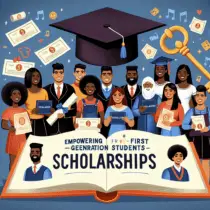Introduction:
Online learning has become increasingly popular in the digital age, offering a convenient and flexible way for individuals to enhance their knowledge and skills. However, the cost of online education can sometimes be a barrier for many aspiring learners. Fortunately, scholarships are an invaluable resource that can empower online learners by providing financial support and unlocking numerous opportunities.
In this article, we will explore the significance of scholarships in online education and how they can help individuals pursue their educational goals. We will delve into the different types of scholarships available for online learners, highlight the benefits they offer, and provide guidance on how to find and apply for these opportunities. Whether you are a student seeking financial aid or an advocate for accessible education, this article will equip you with valuable insights on empowering online learners through scholarships.
The Importance of Scholarships in Online Education
1. Financial Support:
Tuition fees for online courses can vary significantly depending on the program and institution. Scholarships play a pivotal role in alleviating this financial burden by providing funds to cover tuition expenses, thus making education more affordable and accessible to a wider range of individuals.
2. Motivation and Encouragement:
Scholarships not only offer financial aid but also serve as sources of motivation for students. The recognition that comes with being awarded a scholarship can inspire learners to strive for academic excellence. Scholarship recipients often feel an increased sense of accomplishment and pride, which encourages them to continue pursuing their educational goals with determination.
Types of Scholarships Available
1. Merit-Based Scholarships:
Merit-based scholarships are awarded based on academic achievement or other exceptional qualities such as leadership skills or artistic talent. These scholarships recognize individuals who have demonstrated outstanding performance in their respective fields and provide them with financial support to further their education online.
2. Need-Based Scholarships:
Need-based scholarships are designed to assist students who demonstrate financial need. These scholarships are typically awarded based on an individual’s income level, family circumstances, or other factors that indicate financial disadvantage. Need-based scholarships aim to ensure that economic barriers do not hinder individuals from accessing quality online education.
The Benefits of Scholarships for Online Learners
1. Access to High-Quality Education:
Online learning offers a wealth of educational opportunities, ranging from degree programs to professional certifications. However, the cost of these programs can often be prohibitive. Scholarships bridge this gap by providing deserving learners with the financial means to access high-quality education and acquire valuable skills for personal and professional development.
2. Enhanced Career Opportunities:
Employers value individuals who have invested in their education and have demonstrated dedication and commitment through securing scholarships. A scholarship can serve as a testament to an individual’s determination and drive, setting them apart from other candidates during job applications or advancement opportunities.
Finding and Applying for Scholarships
The process of finding and applying for scholarships may seem daunting, but with careful planning and research, it can be a rewarding endeavor:
1. Conduct Thorough Research:
Start by searching online platforms dedicated to scholarship listings or visiting the websites of organizations that provide funding for online learners. Make a list of potential scholarships that align with your academic interests or personal circumstances.
2. Review Eligibility Criteria:
Carefully read through the eligibility criteria for each scholarship you are considering applying for. Take note of any specific requirements such as GPA thresholds, essay submissions, or letters of recommendation.
3. Prepare your Application:
Gather all necessary documents and information required for the scholarship application. This may include academic transcripts, personal statements, and reference letters. It is essential to tailor your application to each scholarship’s specific requirements to increase your chances of success.
Frequently Asked Questions (FAQ)
1. Can online learners apply for scholarships?
Absolutely! Online learners are eligible for a wide range of scholarships. Many institutions and organizations recognize the value of online education and offer scholarships specifically tailored for online learners.
2. Are scholarships only available for degree programs?
No, scholarships are available for various types of online programs, including degree programs, professional certifications, and skill-based courses. There are scholarships suitable for learners pursuing diverse educational goals.
3. How do I increase my chances of receiving a scholarship?
To increase your chances of receiving a scholarship, focus on maintaining strong academic performance, demonstrating leadership or exceptional skills in your field, and submitting a well-crafted application that aligns with the specific requirements outlined by each scholarship.
4. Are there scholarships available specifically for underrepresented groups?
Yes, many scholarships exist specifically to support underrepresented groups in their pursuit of education. These scholarships aim to address historical inequalities and create more opportunities for individuals belonging to marginalized communities.
5. When should I start searching for scholarships?
It is best to start searching for scholarships well in advance of your desired program start date or application deadlines. Some scholarships have early deadlines or limited funds available, so being proactive will give you more time to identify and apply for suitable opportunities.
Conclusion:
Scholarships play a vital role in empowering online learners by providing financial support and unlocking opportunities for personal and professional growth. Through scholarships, individuals can overcome financial barriers and access high-quality education, thereby expanding their knowledge, skills, and career prospects. By understanding the different types of scholarships available and effectively navigating the application process, online learners can seize the educational opportunities that scholarships offer.






